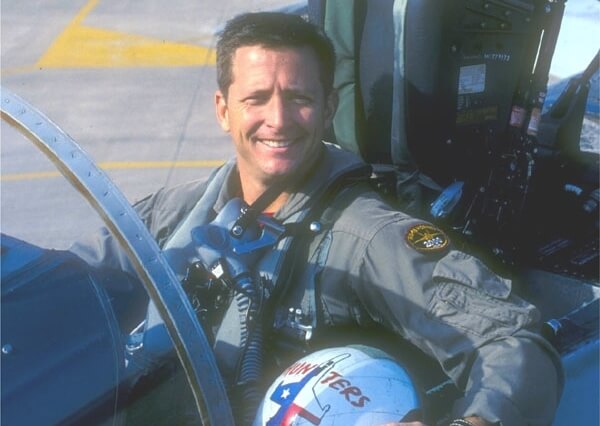Navy Reserve Lt. E. Matthew Buckley, call sign Whiz, was scheduled for his first flight as an American Airlines pilot the morning of September 11, 2001.
After 10 years in the Navy, Buckley had recently transitioned from being an F/A-18 pilot to a Navy reservist, flying fighters part time with a reserve squadron based in Fort Worth, Texas.
“I won the lottery. I was living the dream,” he said. “I was going to be a rich airline pilot and get to fly fighters on the weekends.”
At least, that was the plan.
While getting ready for his first commercial flight from Dallas Fort Worth to Miami and then Miami to Cancun, Whiz turned on the news and saw the North Tower of the World Trade Center had been hit with a plane.
While he was watching, the second plane slammed into the South Tower.
“I realized in a blink that we were under attack,” he said.
He was immediately recalled back to his reserve unit VFA-201 at Naval Air Station Fort Worth, arriving just before the base was put under lockdown.
Shortly after getting on base, American Flight 77 crashed into the Pentagon. At 10:07, United Flight 93 crashed in a field near Shanksville, Pennsylvania.
As he waited, Whiz couldn’t believe this was happening.
“It was insane. I went from almost flying an airliner, to potentially shooting one down,” he said.
The first day’s flight was a routine hop. A day later, a plane was spotted in closed airspace near President George W. Bush’s Texas home. Whiz received direction to launch and intercept. Due to the nature of the event and the location of the unidentified aircraft, he was authorized to go supersonic – faster than the speed of sound – and cleared to do so at 1,000 feet, something that would normally never be approved.
“You can’t do that unless you’re over the desert – supersonic breaks windows – but we didn’t know who it was at the time,” Buckley said.
“I was carrying live missiles … [and]full ammo. I remember stepping outside myself and saying, ‘I can’t believe you’re doing this.'”
The culprits ended up being a small propeller plane flown by a 74-year-old and his grandson who were confused about the no-fly order.
Whiz slowed down and made three circles around the prop plane, gesturing for the pilot to land. He then circled the airfield until police and Texas rangers arrived on the scene.
Once the country began to sort out the new post-9/11 normal, Whiz found things were changed. He was furloughed from the airline before he was ever able to make a flight.
“In the blink of an eye I lost my job,” he said.
To make ends meet, he and his wife worked multiple jobs, all while juggling caring for their 8-month-old son.
“When you lose everything, you tend to scramble pretty quickly,” Buckley added.
From there, he made his way in the trading industry, using the tactical skills he’d developed as a pilot to buy and sell stocks.
“Getting furloughed was the best thing that ever happened to me. It forced me to realize I’m not just a pilot. I have other skills. If you can make quick decisions in a short amount of time and have the right outcomes, along with leadership, I had to wake up and realize the skills the military gave me can be used somewhere else,” he said.
He also sees intersections between the post-9/11 era and the coronavirus, with how many vets are or will soon be in an unexpected place.
“I want to help vets who have some dark days coming. It’s not easy – it sucks, but it’s definitely doable. They can lead and execute and re-use their skills.”
Matthew Buckley is the founder of Top Gun Options and Fighter Financial, LLC.

